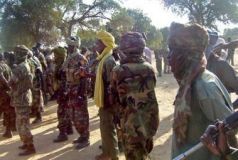Youths in Chad seized, forced to fight on border
Jan 18, 2006 (N’DJAMENA) — Young men in Chad are being rounded up, given guns and used as little more than human shields as the army battles a growing rebel threat near its eastern border, rights groups and students say.
 Hundreds of youths had been press-ganged and sent to the border with Sudan’s troubled Darfur region to fight in Chad’s army, which has been weakened by mass desertions, the groups said. The government denies forcing youths to fight.
Hundreds of youths had been press-ganged and sent to the border with Sudan’s troubled Darfur region to fight in Chad’s army, which has been weakened by mass desertions, the groups said. The government denies forcing youths to fight.
“There’s absolutely no doubt (the young men) are being sent to the war zone,” said Jacqueline Moudeina, a prominent lawyer and president of the Chadian Association for the Promotion and Defence of Human Rights (ATDPH).
“They are being used as human shields … We have lots of information to back this up, including testimony from witnesses who have managed to escape,” she told Reuters.
Poor, landlocked Chad accuses Sudan of sheltering and backing Chadian rebels who attacked the border town of Adre last month. The former French colony has declared a “state of belligerence” with Khartoum, which denies supporting the rebels.
Chad also says cross-border raids by Sudanese militia groups have killed more than 600 Chadians. Sudan says Chadian President Idriss Deby is using the dispute to deflect attention from troubles at home.
Chad has been bolstering its military presence in the east since the December 18 attacks on Adre, which the government said it repulsed, killing about 300 rebels. The rebels say they lost only nine men and killed more than 70 army soldiers, although there has been no independent confirmation of either account.
“SEIZED AND BEATEN”
Chad’s Minister for Public Security, Routouang Yoma Golom, said Deby had decided to reinforce the army after a wave of desertions last year and that a recruitment drive was underway.
He said security forces had rounded up more than 300 people in recent days but that they were young “Colombians” — street urchins behind a crime spree in the capital N’Djamena. He denied they were being sent to fight.
“The people who the police rounded up are delinquents who could not be looked after by their parents,” Golom said.
“By no means do the police or us want to use force to send Chadians into the army. Everyone recruited so far has been a volunteer,” he said, denying reports that some of those recruited were aged under 18.
Some students said they had been arrested for no reason, held in groups and beaten by the security forces.
“It was Sunday morning and I was in my room. I got up very early in the morning to go to the toilet. I was just outside my door when I was arrested by the military,” said one 20-year-old, who asked not to be named.
“I told them ‘I’ve got all my papers’ but they refused to see them … They tortured me. They took off my clothes and tore them to tie me up with. I spent five days in prison,” he said.
The student said he had no idea why he had been freed, but said at least 10 other young men were being held.
“As they arrested us they said we were going to be sent to Bardai (a military barracks in the north). They told us we were going to be sent to war,” he said.
CANNON FODDER
Analysts say Chad’s dispute with Sudan risks spreading the conflict in Darfur, where tens of thousands of people have been killed in fighting between Sudanese government forces and rebels since 2003.
It also compounds a growing insurgency threat against Deby, a 53-year-old former army commander who himself led a revolt from the east to seize power in 1990. Several rebel groups opposed to Deby announced the formation of a political and military alliance earlier this month to try to oust him.
A second human rights group said some of those seized by the police had managed to send messages back to their families saying they were being trained at a military barracks at Moussoro, some 150 kms (94 miles) north of N’Djamena.
“People are being sent to the east to serve as cannon fodder. They are armed when they get there but these are people who don’t know how to make war,” said Deuzoumbe Daniel Passalet, Chadian president of Human Rights Without Borders.
“Their purpose is to walk in front of the military and then they are shot at. They are there to protect the military.”
Across Africa, youths have been forced to fight for armies and militia groups in several countries. Rebel groups have also forced young people into battle, as during Sierra Leone’s war.
Patrice Bendounga, head of a collective of Chadian human rights groups (CADH), said some men were at home when the police arrived and carted them off in front of their wives or children.
One 26-year-old, arrested but freed after his uncle intervened, said the arrests had spread fear in his neighbourhood of N’Djamena.
“On Thursday (January 5) at 4 a.m. they arrested another five men and we don’t know where they were taken. Yesterday they took a person right in front of my eyes,” he said.
“Lots of our brothers have been taken. At least 10 people are being arrested each day — night and day. It’s the military who are committing these barbaric acts,” he added.
“The majority of people being taken are not ‘Colombians’ or bandits, they are just young men like us. But they are being taken to be sent to the battlefields.”
(Reuters)
